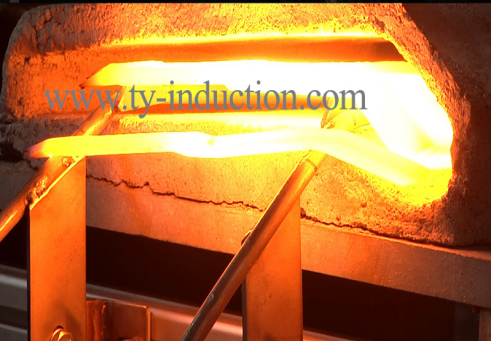Titanium Alloy Demand in Surgical Tools Pushes Forging Shops to Upgrade Equipment
August 25, 2025
The demand for titanium alloy surgical tools has been steadily increasing, driven by the growth of minimally invasive surgeries, orthopedic procedures, and the overall expansion of the medical device market. Titanium’s unique combination of high strength, low density, and biocompatibility makes it the material of choice for instruments ranging from surgical scalpels and forceps to orthopedic implants.
As hospitals and medical device manufacturers push for more precise, durable, and lightweight tools, forging shops are facing mounting pressure to upgrade their equipment to meet both production volume and quality standards. TY INDUCTION, a leading provider of induction heating solutions, has been at the forefront of enabling these upgrades.
Medical professionals increasingly prefer titanium-based instruments due to several factors:
· Lightweight: Titanium tools reduce fatigue during long surgeries.
· Durability: High resistance to wear and corrosion extends tool life.
· Biocompatibility: Minimizes the risk of adverse reactions in patients.
· Precision: Titanium can be forged and machined to extremely tight tolerances, critical for surgical applications.
This rising demand is fueling growth in the surgical tools segment and prompting forging shops to rethink their manufacturing capabilities.

Forging titanium alloys presents unique technical challenges compared to traditional stainless steel or aluminum:
· High Strength at Elevated Temperatures: Titanium requires precise heating control during forging to avoid cracking or deformation.
· Tool Wear: Conventional dies and presses wear out faster when handling titanium, necessitating more durable tooling materials.
· Complex Geometry: Surgical tools often require intricate shapes, demanding advanced forging techniques and multi-stage processing.
· Quality Standards: Medical-grade instruments must comply with stringent regulatory standards, including ISO 13485 and FDA approvals, leaving little room for production error.
These challenges have prompted forging shops to invest in high-performance induction heating systems, precision presses, and automated quality control solutions, with TY INDUCTION supplying key technologies that enable these upgrades.
Forging shops looking to meet the growing requirements of the medical device market have implemented several upgrades:
· Induction Heating Systems: Modern induction furnaces allow rapid, uniform heating of titanium billets, reducing cycle times and minimizing microstructural defects.
· High-Precision Forging Presses: Hydraulic and servo-electric presses provide consistent force application, essential for producing complex surgical tool geometries.
· Automated Handling and Inspection: Robotics and advanced sensors improve throughput while ensuring tight tolerances.
· Enhanced Tooling Materials: Forging dies made from high-strength alloys or coated with wear-resistant layers extend die life when processing titanium.
These technological improvements have allowed forging shops to increase output, improve quality, and reduce waste, meeting the exacting standards required for surgical applications.
TY INDUCTION has recently partnered with a mid-sized forging shop specializing in titanium orthopedic tools. This shop faced multiple challenges:
· Inconsistent Heating: Traditional gas-fired furnaces could not heat titanium billets evenly, leading to micro-cracks and rejected components.
· Long Cycle Times: Manual loading and inconsistent temperature control slowed production, limiting output to around 200 tools per day.
· Tooling Wear: Frequent die replacements due to uneven heating increased operational costs.
· High-Frequency Induction Furnace Installation: TY INDUCTION installed a 150 kW high-frequency induction system capable of heating titanium billets uniformly within 6–8 minutes, reducing preheating time by 60%.
· Automated Temperature Monitoring: Integrated thermal sensors provided real-time feedback, ensuring billets reached optimal forging temperature without overheating.
· Precision Forging Integration: The induction system was synchronized with existing hydraulic presses, allowing continuous production with minimal downtime.
· Increased Throughput: Daily output increased from 200 to 500 surgical tools, enabling the forging shop to take on larger orders.
· Reduced Material Waste: Even heating minimized billet cracking, cutting scrap rates by 35%.
· Extended Tool Life: Consistent temperatures reduced die wear, lowering tooling costs by 20%.
· Quality Compliance: All forged components met ISO 13485 and FDA tolerances, facilitating faster delivery to medical device manufacturers.
This case demonstrates how targeted equipment upgrades, supported by TY INDUCTION’s advanced technology, directly address the challenges of titanium alloy forging while improving efficiency and cost-effectiveness.
The push for advanced equipment reflects broader dynamics in surgical tool manufacturing:
· Faster Time-to-Market: Medical device companies demand reliable suppliers capable of producing high-quality titanium instruments efficiently.
· Customization: Surgeons increasingly require tools tailored to specific procedures, necessitating flexible, precise forging solutions.
· Cost Management: Efficient titanium forging reduces energy consumption, scrap, and downtime, helping suppliers remain competitive.
Forging shops that fail to upgrade risk losing contracts to competitors capable of delivering consistent, high-quality products on time.
With the global surgical tools market projected to grow steadily, forging shops will continue investing in:
· Digital Forging Technologies: AI and sensor integration to optimize heating, forging force, and cycle timing.
· Energy-Efficient Induction Systems: Reducing operational costs while maintaining high output.
· Automated Inspection: Ensuring each tool meets stringent medical specifications without slowing production.
TY INDUCTION’s solutions position forging shops to produce titanium surgical tools that are lightweight, durable, and precise, meeting the exacting demands of modern healthcare providers.
The growth in titanium alloy surgical tools is reshaping the forging industry, demanding advanced equipment, automation, and stringent quality control. TY INDUCTION has proven that with the right induction heating systems and integrated forging solutions, shops can increase output, reduce waste, and maintain compliance with global medical standards.
TY INDUCTION provides cutting-edge induction heating solutions that enable forging shops to handle titanium alloys with precision, efficiency, and consistency, ensuring that the next generation of surgical tools meets the highest standards of quality and performance.
Hot Products
Contact Us
Enquiry hotline:
+86 135 4128 7190
Email:
Address:
No.18,14th Floor, Building 2, No. 169 Zhongli Road, Banzhuyuan Subdistrict, Xindu District, Chengdu, Sichuan, China, Code:610000
Related Products
